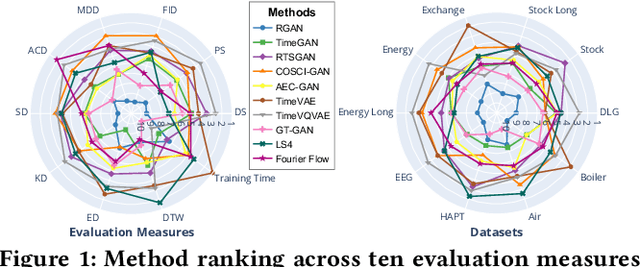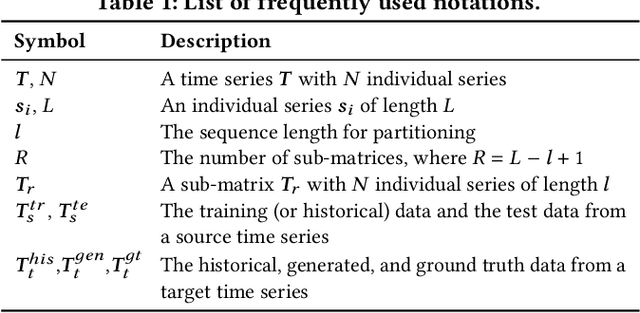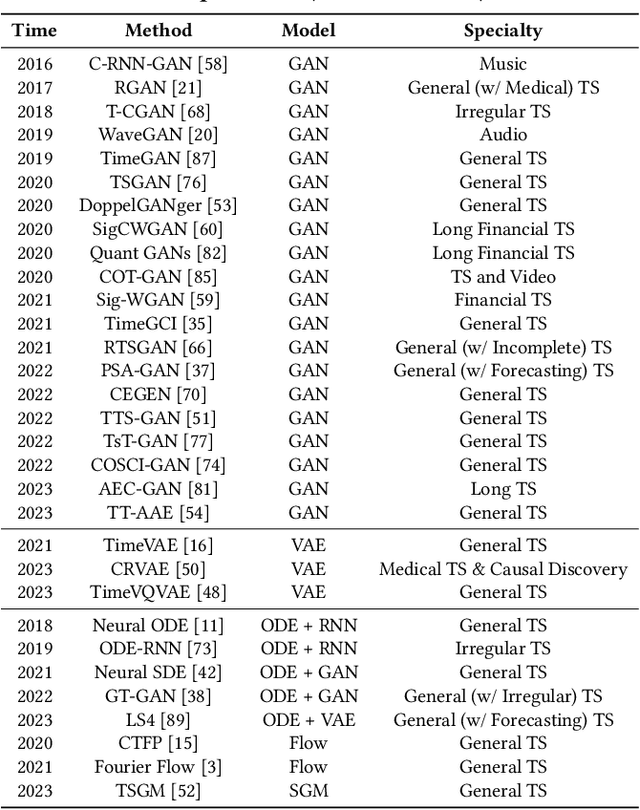Yihao Ang
Towards Controllable Time Series Generation
Mar 06, 2024Abstract:Time Series Generation (TSG) has emerged as a pivotal technique in synthesizing data that accurately mirrors real-world time series, becoming indispensable in numerous applications. Despite significant advancements in TSG, its efficacy frequently hinges on having large training datasets. This dependency presents a substantial challenge in data-scarce scenarios, especially when dealing with rare or unique conditions. To confront these challenges, we explore a new problem of Controllable Time Series Generation (CTSG), aiming to produce synthetic time series that can adapt to various external conditions, thereby tackling the data scarcity issue. In this paper, we propose \textbf{C}ontrollable \textbf{T}ime \textbf{S}eries (\textsf{CTS}), an innovative VAE-agnostic framework tailored for CTSG. A key feature of \textsf{CTS} is that it decouples the mapping process from standard VAE training, enabling precise learning of a complex interplay between latent features and external conditions. Moreover, we develop a comprehensive evaluation scheme for CTSG. Extensive experiments across three real-world time series datasets showcase \textsf{CTS}'s exceptional capabilities in generating high-quality, controllable outputs. This underscores its adeptness in seamlessly integrating latent features with external conditions. Extending \textsf{CTS} to the image domain highlights its remarkable potential for explainability and further reinforces its versatility across different modalities.
TSGBench: Time Series Generation Benchmark
Sep 07, 2023



Abstract:Synthetic Time Series Generation (TSG) is crucial in a range of applications, including data augmentation, anomaly detection, and privacy preservation. Although significant strides have been made in this field, existing methods exhibit three key limitations: (1) They often benchmark against similar model types, constraining a holistic view of performance capabilities. (2) The use of specialized synthetic and private datasets introduces biases and hampers generalizability. (3) Ambiguous evaluation measures, often tied to custom networks or downstream tasks, hinder consistent and fair comparison. To overcome these limitations, we introduce \textsf{TSGBench}, the inaugural TSG Benchmark, designed for a unified and comprehensive assessment of TSG methods. It comprises three modules: (1) a curated collection of publicly available, real-world datasets tailored for TSG, together with a standardized preprocessing pipeline; (2) a comprehensive evaluation measures suite including vanilla measures, new distance-based assessments, and visualization tools; (3) a pioneering generalization test rooted in Domain Adaptation (DA), compatible with all methods. We have conducted extensive experiments across ten real-world datasets from diverse domains, utilizing ten advanced TSG methods and twelve evaluation measures, all gauged through \textsf{TSGBench}. The results highlight its remarkable efficacy and consistency. More importantly, \textsf{TSGBench} delivers a statistical breakdown of method rankings, illuminating performance variations across different datasets and measures, and offering nuanced insights into the effectiveness of each method.
 Add to Chrome
Add to Chrome Add to Firefox
Add to Firefox Add to Edge
Add to Edge